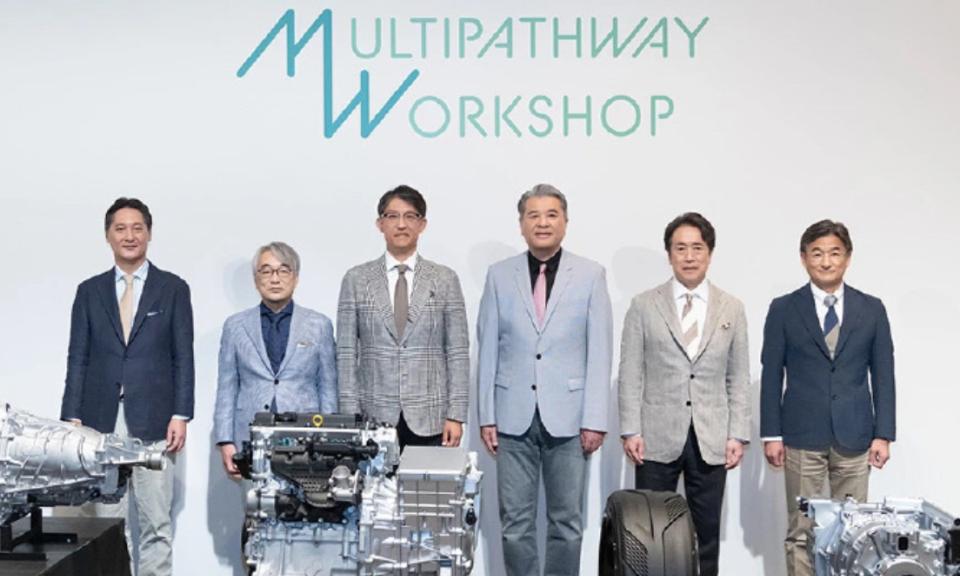All-out fight against the tram! Toyota and a Japanese car company developed a super internal combustion engine
Rice grains say car
2024-06-05 07:07Posted in Jiangsu Automobile Creators
The attitude of major traditional fuel car companies towards electric vehicles and internal combustion engines can be described as wavering, both tangled and eager.
The purpose of looking forward to electric vehicles is to create their own myth in the field of electric vehicles, further increase sales, and rank higher in annual sales. However, at the same time, it lacks the moat of the brand halo, and it is difficult to compete with some new car-making forces. Therefore, they are eager to return to the era of fuel vehicles, which has led to a variety of different operations for electric vehicles by fuel manufacturers.

Recently, Toyota, Mazda and Subaru jointly issued a statement that they will no longer fight alone, and these three car companies, like Renault, Nissan and the Mitsubishi Alliance, will jointly develop a new next-generation internal combustion engine, hoping to break down the barriers to internal combustion engines by integrating the technologies they are good at. Through the introduction of new internal combustion engines, the company wants to regain a huge advantage in fuel vehicles and offset the advantages of rapid development of electric vehicles.
These three automakers plan to launch more advantageous integrated products in the field of three-cylinder engines and four-cylinder engines in the future, but their focus is different. Mazda prefers to introduce extended-range hybrid engines because it has already established a new rotary engine team. Subaru is still working on the horizontally opposed engine, but the original pure fuel powertrain will be converted to a hybrid. Combining the above advantages, then there will be a super engine mass production in the future.
But the other two super car companies have made very different experiences: Nissan and Honda. Both automakers said they would not invest more in gasoline-powered vehicles. Honda said that all the cars launched in 2024 will be electric, and Honda has also launched a new electric vehicle sub-brand Ye in China, which is ambitious and is bound to win an important part of the electric vehicle market.
Nissan Motor said that its future development direction will be electric vehicles, and it will not invest in any more fuel powertrains, and also said that car sales in the period from 2024 to 2030 will mainly be achieved through e-power internal combustion engines. Strictly speaking, the internal combustion engine is not powered, a bit like the range extender on an ideal SUV, which only charges the battery and does not directly participate in the drive, so the theoretical thermal efficiency can be very high, and is expected to reach up to 50%.
I think that as Nissan fully transitions to electric vehicles, whether it is Mitsubishi Motors or Renault Motors, the attitude is the same, and in the future, we will also promote electrification in an all-round way. Therefore, as these traditional fuel vehicle companies turn around and turn to the field of electric vehicles, the future of fuel vehicles is very slim.
Although Toyota, Mazda, and Subaru have jointly developed the super engine, I think that the internal combustion engine has a history of more than 100 years, and it is extremely unlikely that the internal combustion engine will achieve a new and major breakthrough. It is also unlikely that the super engine will reverse the decline of gasoline vehicles.
In fact, except for Toyota, whose sales volume will exceed 10 million in 2023, both Mazda and Subaru have been extremely marginalized. For Mazda and Subaru, this should be the last blow, and if the transformation fails, it will be a very significant blow for these two car companies.
View original image 804K
-

All-out fight against the tram! Toyota and a Japanese car company developed a super internal combustion engine -
All-out fight against the tram! Toyota and a Japanese car company developed a super internal combustion engine -
All-out fight against the tram! Toyota and a Japanese car company developed a super internal combustion engine -
All-out fight against the tram! Toyota and a Japanese car company developed a super internal combustion engine -
All-out fight against the tram! Toyota and a Japanese car company developed a super internal combustion engine